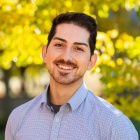Financial Social Work
Helping people improve their relationship with money

By Devon Dams-O’Connor
Money is a complex thing.
Having enough doesn’t guarantee happiness, and not having enough can create an interconnected web of pain points that impact everything from housing and nutrition to safety and mental health. Layer in the complexities of generational poverty, family dynamics, habits and personal relationships with saving and spending, and it becomes clear that financial wellness is about a lot more than just dollars and cents.
Financial social workers help to add clarity to this complexity. Here, two University at Buffalo School of Social Work alumni share more about this emerging field, why they chose it and what this work allows them to do.
Matthew L. Schwartz, DSW ’23, MSW ’18, is a licensed clinical social worker (LCSW) and certified financial social worker (CFSW) who co-authored an upcoming textbook on the subject called, Financial Social Work: Micro, Mezzo and Macro Practice. He is a therapist in private practice and director of research for the Center for Financial Social Work.
Danial Khan, MBA/MSW ’21, also a certified financial social worker, is a financial wellness educator and consultant. He teaches personal finance and offers financial coaching at Stanford University through his role as senior relationship manager at Stanford Federal Credit Union.

Matthew L. Schwartz
What is financial social work?
Schwartz: “We work with people to change their behaviors around how they earn, save and spend money. We change relationships with money. We help clients become comfortable sitting with their finances and learn where their relationship with money began and what shaped it through childhood and adulthood.”
How does a financial social worker differ from a financial planner or advisor?
Schwartz: “I don’t make recommendations about where to invest or how. Instead, we work to change financial behavior. It’s evidenced-based behavioral health care that helps people relate to their finances and change emotions and behaviors related to money. I’ll give accurate information on risks and benefits of having a retirement account. But a planner identifies where to invest, how much and when, and sells plans and products and advice. Once someone is stable in their finances, we may refer out to a planner to set up that retirement account.”

Danial Khan
Who are your clients?
Schwartz: “In community practice, I work with folks who are struggling with the system. They might be on Medicaid or facing eviction. We’ll work to improve their situation and eventually transition off entitlement services.”
Khan: “We can be a helpful resource for people on any point of the wealth spectrum. Many of the students I work with at Stanford are international students without resources. They don’t understand the U.S. banking system, how to send money home to family, and have trouble budgeting for groceries, even though they’re incredibly smart.”
Schwartz: “We also work with millionaires. They’re not always in a healthy relationship with money either. For couples and families, we can help with interpersonal relationship issues; everyone grows up relating to money differently, and we’ll work on coming to common ground for how to be happy with spending habits and priorities.”
What are some financial issues you might work through with your clients?
Schwartz: “We’ll help folks stay away from scams, like “buy now, pay later,” that get them into debt. Our clients are vulnerable and trapped in a cycle of transgenerational financial trauma. If they have bipolar disorder and experience manic episodes, we formulate a game plan for who to give their credit cards to and how to safeguard their assets. If someone has substance use disorder, money often goes out as soon as it comes in, and what strategies can we put in place there?
“I was working with a client once doing a cash flow analysis to see where money was coming in and where it was going. The numbers weren’t adding up. As a social worker, I was able to ask whether some funds were going to drugs, quantify that amount and see how much they were actually spending. The person recommitted to recovery after seeing they were cheating themselves out of saving for a downpayment on a house.”
What drew you to this profession?
Khan: “One professor knew I had an interest in financial well-being and did a great job of bridging classes in School of Management and School of Social Work for MBA/MSW dual degree students. He’s the one who said, ‘I think you’d be interested in financial social work.’”
Schwartz: “I was working as a case manager at a nonprofit and realized I wanted to do social work. When we’re talking with clients about benefits, resources and shortages, we’re talking about money. Money is the underpinning of our profession. So, I got certified as a CFSW while earning my DSW.”
How do you become a financial social worker?
Schwartz: “The Center for Financial Social Work has a very intense training program. It’s self-pay, self-study. There are massive books to learn, six months to learn it all, then an exam and a written component to become certified.”
What qualities make someone a good fit for financial social work?
Schwartz: “Any social worker has to be curious, but doubly so in financial social work. You have to be able to ask personal questions in a way that doesn’t shame or harm [your clients] or turn them off the process. It’s a respectful curiosity. Also not having math fear—the math we do is simple addition and subtraction, no major formulas.”
Khan: “Financial social workers must have a desire to teach. If someone has support in understanding finances, it provides security and freedom of choice, which are powerful things. One lesson can have a trickle effect of setting someone up for success for the rest of their life.”
Published May 22, 2025
